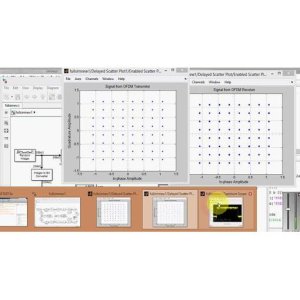An Innovative Approach for Enhanced Overcurrent Protection Using PID Controller with Consideration for Different Fault Conditions
Problem Definition
The power system is a crucial element in providing uninterrupted power supply, but it is prone to various losses and faults. Current protection systems, such as the IDMT over-current relay, have been utilized to safeguard devices from over-current issues. However, these existing protection methods have significant limitations. One key drawback is the delay in tripping of the relay, which can potentially lead to damage to equipment. Another issue is the variation in fault severity, where the relay takes longer to trip for single-phase faults compared to two or three-phase faults.
This inconsistency in tripping times can result in over-current damage if not addressed promptly. Therefore, there is a pressing need for a relay system that can quickly and effectively trip under various fault conditions to ensure the continuous and reliable operation of the power system.
Objective
The objective is to design a PID controller-based relay system for over-current protection in power systems to enhance responsiveness, accuracy, and reliability. The new system aims to quickly isolate devices in case of anomalous current utilization and provide fast tripping for single, double, or three-phase faults to ensure continuous and reliable operation of the power system. The use of a PID controller is justified by its ability to provide precise and responsive control in dynamic systems, addressing the limitations of existing relay systems and improving efficiency while reducing the risks of equipment damage.
Proposed Work
In the proposed work, the focus is on designing a PID controller-based relay system for over-current protection in power systems. By replacing the existing IDMT over-current relay with a PID controller, the aim is to enhance the responsiveness and accuracy of the relay. This new system will continuously monitor the rating current of the device and quickly isolate the device in case of anomalous current utilization, thus providing protection against equipment damage in various faulty conditions. Additionally, the PID controller-based relay will ensure fast tripping for single, double, or three-phase faults, making the power system more secure and reliable.
The rationale behind choosing the PID controller for the proposed project lies in its ability to provide precise and responsive control in dynamic systems.
The PID controller is a widely used control algorithm that is known for its effectiveness in maintaining stability and accuracy in various applications. By leveraging the PID controller's capabilities, the proposed relay system will be able to quickly detect and respond to over-current faults, ensuring timely protection of the power system. This approach addresses the research gap identified in the literature survey, where existing relay systems were found to have limitations in terms of tripping time and fault severity variation. Therefore, by implementing the PID controller-based relay system, the project aims to achieve faster and more reliable protection for power systems, ultimately leading to improved efficiency and reduced risks of equipment damage.
Application Area for Industry
This project can be implemented in various industrial sectors such as manufacturing plants, power generation facilities, and distribution networks. The proposed PID controller based relay solution addresses the common issue of delays in tripping over-current protection devices, which can lead to equipment damage and downtime in industrial operations. By providing quick and effective tripping for single, double, or three-phase faults, the PID controller improves the overall reliability and safety of the power systems in different industrial domains. This solution ensures timely protection for devices under different faulty conditions, making the system more secure and reducing the risk of over-current damage. Overall, implementing PID controller based relay can lead to improved efficiency, reduced maintenance costs, and increased operational reliability across various industrial sectors.
Application Area for Academics
The proposed project of designing a PID controller based relay for power systems can greatly enrich academic research, education, and training in the field of electrical engineering. This project has the potential to introduce innovative research methods and simulations for improving the protection of power systems from over-current faults. Researchers, MTech students, and PhD scholars in the field of power systems can utilize the code and literature of this project to enhance their understanding and develop new solutions for power system protection.
This project is relevant for research in the domain of power system protection and control. By implementing a PID controller based relay, researchers can explore the effectiveness of this approach in improving the response time and accuracy of fault detection in power systems.
The project can also serve as a learning tool for students to understand the impact of digital signal processing techniques on power system protection.
The application of PID controller in power system protection can open up new possibilities for data analysis and optimization in educational settings. By analyzing the performance of the PID controller in different fault scenarios, students can gain valuable insights into the behavior of power systems under varying conditions. This hands-on experience can enhance their problem-solving skills and critical thinking abilities.
Furthermore, the PID controller based relay can be utilized for conducting experiments and simulations in laboratory settings, allowing students to observe real-time responses of the relay to different fault conditions.
This practical exposure can greatly benefit students in gaining a deeper understanding of power system protection mechanisms.
In the future, the scope of this project could be extended to incorporate advanced control algorithms and real-time monitoring systems for enhancing the reliability and efficiency of power system protection. With further research and development, the PID controller based relay can pave the way for the implementation of smart grid technologies in power systems, leading to more sustainable and resilient energy infrastructure.
Algorithms Used
The PID controller is used in the proposed system to replace the existing relay in order to continuously detect the rating current of the device and automatically isolate it in case of anomalous current utilization. This approach aims to provide better protection for the device compared to the existing method by quickly reacting to various faulty conditions such as single, double, or 3-phase faults and performing fast tripping to prevent damage caused by over-current. By implementing the PID controller based relay, the system becomes more efficient in determining time-delay for overcurrent protection compared to traditional IDMT over-current relays.
Keywords
SEO-optimized keywords: PID controller, relay, over-current protection, power systems, IDMT relay, delayed tripping time, equipment damage, efficient protection, timely protection, over-current faults, responsiveness, accuracy, uninterrupted power supply, digital signal processing, fault severity variation, tripping time, current utilization, anomalous current, quick tripping, faulty conditions, time-delay determination technique, system security, damages prevention.
SEO Tags
power system, over-current protection, PID controller, IDMT relay, equipment damage, fault detection, power system protection, digital signal processing, relay tripping time, power system faults, relay-based protection, fault severity, power system losses, fault analysis, fast tripping relay, power system reliability, intelligent relay system, power system security, efficiency in protection, timely protection, fault detection techniques, advanced power system protection
| Shipping Cost |
|
No reviews found!


















































No comments found for this product. Be the first to comment!